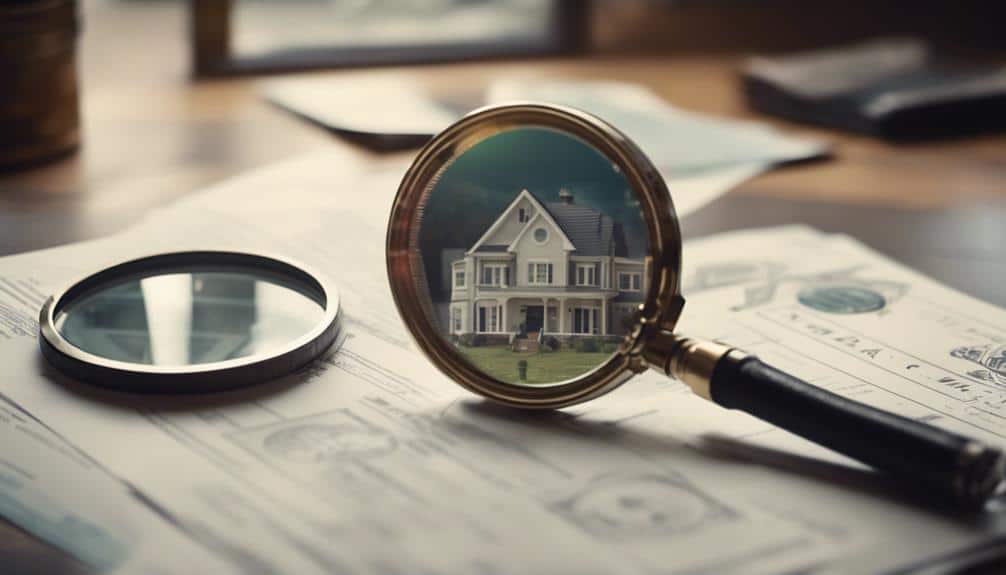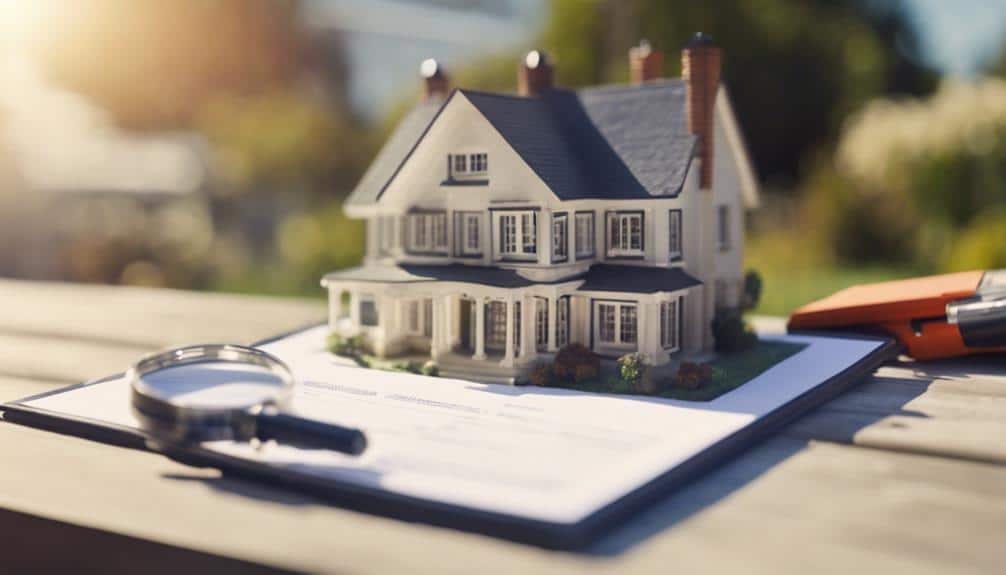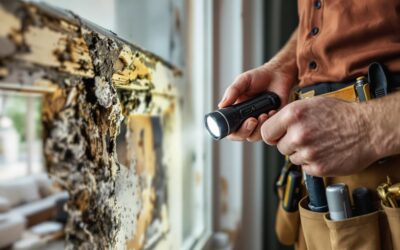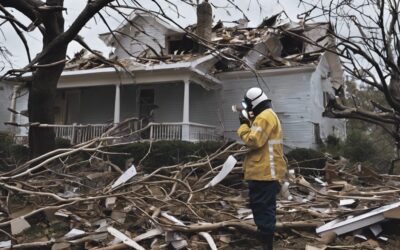To guarantee confidence in your home inspector, validating theirstate license and pursuing certifications from reputable organizations like ASHI and InterNACHI is crucial. Additionally, prioritize inspectors with 3-5 years of experience and a proven track record of conducting 250-300 inspections across various property types. Furthermore, conducting a comprehensive review involves leveraging modern technology, such as thermal imaging, for accurate evaluations, emphasizing effective communication, professionalism, insurance coverage, bonding, and positive customer reviews.
All of these factors contribute to the thoroughness of the inspection and the quality of post-inspection support offered. Understanding these interconnected factors empowers your selection process. It establishes a solid groundwork for ongoing assistance and guidance from your inspector, thus underscoring the significance of recognizing and adhering to the home inspection essentials throughout the entire inspection journey.
Essential Insights and Key ConsiderationsKey Takeaways
- Choose an inspector with a current state license and reputable certifications, such as ASHI or InterNACHI.
- Look for an inspector with at least 3-5 years of experience and a history of conducting 250-300 home inspections.
- Ensure the inspector uses modern technology, like thermal imaging, for more accurate evaluations.
- Prioritize inspectors with solid communication skills and a professional approach, including prompt responses and comprehensive reporting.
- Verify the inspector has Errors & Omissions Insurance, bonding, and professional affiliations for accountability and high standards.
Identifying Professional Credentials
Securing your chosen home inspector possesses the proper professional credentials is a crucial step in safeguarding the quality and reliability of your home inspection. When initiating this critical process, the first factor to ponder is whether the inspector holds a current license, as mandated by your state. This is not just a formality; it’s a foundational aspect of their professional capability and adherence to regulated standards.
Delve deeper by exploring the inspector’s certifications from reputable professional organizations like the American Society of Home Inspectors (ASHI) and the International Association of Certified Home Inspectors (InterNACHI). These certifications are not simply titles; they assure that the person has met rigorous professional standards and is committed to ongoing education in their field. Certified inspectors are more likely to utilize a thorough checklist, ensuring no stone is left unturned during inspection.
Furthermore, examining the inspector’s professional affiliations and memberships can offer further insight into their dedication and standing in the industry. Membership in these organizations often requires a commitment to ethical standards, providing you with additional confidence in your selection. By prioritizing these credentials, you ensure your home inspection is conducted with the highest expertise and care.
Evaluating Relevant Experience
When assessing a home inspector’s pertinent experience, it is vital to consider the duration of their inspection practice, demonstrating their hands-on expertise and familiarity with various issues. Additionally, specific industry credentials can indicate expert knowledge and a dedication to upholding high standards in their work. Finally, the diversity of properties they have inspected, from historic homes to new constructions, indicates a breadth of experience that can be invaluable in identifying potential issues in the property you are contemplating purchasing.
Years of Inspection Practice
The selection of a home inspector with a strong foundation in years of inspection practice is crucial for a thorough assessment of any property. Inspectors with at least 3-5 years of experience bring a wealth of knowledge and expertise essential for identifying issues across a spectrum of residential construction types. This duration of involvement guarantees they have navigated the certification requirements necessary for proficiency in the field.
Having conducted 250-300 home inspections, these professionals demonstrate considerable practical experience and familiarity with various property types, from single-family homes to condos and older structures. Their broad inspectors’ experience in encountering and resolving diverse challenges enriches their capability to deliver meticulous evaluations, making them invaluable to homeowners seeking reassurance in their property’s condition and potential.
Specific Industry Credentials
How can potential homeowners ascertain the relevant experience of a home inspector? One critical step is to look for specific industry credentials that signal a professional’s qualifications. A notable certification to seek is from the American Society of Home Inspectors (ASHI) or InterNACHI, leading organizations in the field.
These certifications indicate that the inspector has met rigorous educational and practical requirements. Evaluating the number of inspections completed can offer insight into their practical knowledge and expertise. Ensuring the inspector holds a current, state-required home inspection license is also essential for regulatory compliance. Additionally, reviewing specialized certifications and their adherence to professional standards and codes of ethics underscores their commitment to quality and ethical service, fostering clients’ sense of belonging and trust.
Variety of Inspected Properties
Given the complexity of residential structures, selecting a home inspector with a wide range of experience across various property types, such as single-family homes, condos, townhouses, and multi-unit buildings, is imperative for a thorough evaluation. Inspecting homes of various properties equips a home inspector with the nuanced knowledge required to identify specific issues inherent to each type. A home inspector’s track record with different property formats and adeptness at pinpointing potential problems showcase their ability to provide thorough insights that are pivotal for making informed decisions.
Confidence in your home inspector grows when they demonstrate a proven history of skillfully maneuvering the intricacies of diverse residential environments, ensuring a detailed and customized inspection that caters to your property’s distinct characteristics.
Understanding Inspection Scope
An essential aspect of selecting a home inspector involves clearly understanding the inspection’s scope, encompassing the inspection coverage areas, and acknowledging the limitations inherent in the process. It is vital to confirm that the inspector’s review includes thoroughly examining all major systems and components of the property, from the exterior and interior to specific assessments such as HVAC, plumbing, and electrical systems. Recognizing the boundaries of what an inspection can reveal is equally significant, as it sets practical expectations and assists in making informed decisions based on the inspector’s findings and recommendations.
Inspection Coverage Areas
When selecting a home inspector, it is crucial to understand that the inspection should thoroughly cover all essential areas of the property, including the exterior, interior, roof, HVAC systems, plumbing, and electrical components, to guarantee a thorough evaluation. The scope of inspector coverage areas is designed to encompass key elements such as structural integrity, safety hazards, water damage, and the home’s overall condition. By evaluating all accessible areas, inspectors can provide a comprehensive assessment, offering potential buyers or sellers confidence in the property’s condition.
Understanding the inspection’s scope ensures that critical aspects are reviewed, reinforcing the importance of a well-rounded assessment that includes significant systems and components. This level of detail highlights the value of a meticulous inspection in making informed decisions.
Limitations of Inspections
Potential homeowners must recognize that, while thorough, home inspections naturally come with limitations. They primarily focus on assessing visible and accessible areas rather than uncovering every conceivable issue. Home inspectors are confined to a visual inspection, meticulously evaluating what is readily observable and reachable. This approach intrinsically means that hidden or inaccessible areas, along with the internal workings of systems and components, are beyond the scope of their examination.
They assess the visible condition without testing every system, which means they cannot predict future problems that may arise. Understanding these limitations is essential for managing expectations. It underscores the importance of possibly seeking additional specialized assessments to complement the initial home inspection, ensuring a complete understanding of the property’s condition.
Checking for Modern Technology Use

Selecting a home inspector who incorporates cutting-edge technology, such as thermal imaging cameras and moisture meters, is crucial for obtaining a more precise evaluation of a property’s condition. Home inspectors who leverage modern technology offer a unique advantage in accurately identifying hidden problems that traditional methods might overlook. Using thermal imaging cameras, for example, can reveal heat loss, insulation deficiencies, and even moisture intrusion without requiring invasive procedures.
This non-intrusive approach preserves the property’s integrity and provides a clearer, more detailed understanding of its condition.
Furthermore, inspectors utilizing advanced tools like drone technology can access and assess hard-to-reach areas, such as rooftops and chimneys, with ease and safety. This capability ensures that no aspect of the property is missed during the inspection process. Using sophisticated software, such as HomeGauge, further enhances the inspector’s ability to deliver detailed reports enriched with high-resolution images, making it easier for clients to grasp the findings.
Choosing an inspector committed to employing modern technology signifies their dedication to providing the most thorough and up-to-date service possible. It reflects a professional ethos that prioritizes accuracy, efficiency, and the highest standards of practice in home inspection.
Assessing Communication Skills
In selecting a home inspector, evaluating their communication skills is vital for thoroughly understanding your property’s condition. An inspector’s proficiency in articulating complex findings in an accessible manner, coupled with their responsiveness and ability to engage with your concerns, dramatically enhances the inspection experience. These attributes—apparent explanation ability, prompt response time, and active listening qualities—form the backbone of effective communication, ensuring you are well-informed and confident in the insights provided.
Clear Explanation Ability
Understanding the complexities of a home’s condition requires a home inspector with the ability to distill intricate issues into comprehensible terms, ensuring clients grasp the significance of the inspection findings. This apparent ability to explain is a cornerstone of effective communication and building trust and confidence in the inspector’s expertise. To assess a home inspector’s communication skills, consider the following:
- Ability to Simplify Complex Issues: Inspectors must translate technical jargon into understandable language.
- Engagement and Responsiveness: They should actively listen and respond to your questions with detailed explanations.
- Comprehensive Reporting: The final report should clearly articulate potential problems, repairs, and maintenance advice, enabling informed decision-making.
Choosing an inspector with these communication skills fosters a sense of belonging and trust, which is essential for a satisfactory home inspection experience.
Prompt Response Time
Assessing a home inspector’s timeliness in responding to inquiries and scheduling requests is a crucial indicator of their practical communication skills and professionalism. Home inspectors display quick and attentive responses, demonstrating their commitment to customer service and dedication to addressing your needs with the urgency they merit. This prompt communication helps build a foundation of trust, which is vital for any homeowner seeking assurance in the thoroughness and dependability of their inspection process.
A home inspector who values timely and clear communication shows a deep appreciation of the significance of trust in the client-inspector relationship. Their capacity to provide information promptly and respond to questions efficiently reflects their professionalism and overall approach to delivering a thorough inspection experience.
Active Listening Qualities
Active listening skills in a home inspector, marked by a genuine engagement with the client’s concerns and inquiries, play a pivotal role in the success of the inspection process. When selecting a home inspector, evaluating their communication skills, specifically their ability to listen actively, is crucial. This can significantly impact the inspection’s outcome and your satisfaction as a client.
- Attentiveness to Details: Ensuring no concern is too small to be addressed.
- Responsiveness to Feedback: Adapting the inspection process based on your input.
- Personalized Inspection: Tailoring the inspection to focus on your areas of concern.
A home inspector who embodies these characteristics demonstrates a dedication to excellence and fosters a sense of belonging and trust in their clients.
Confirming Insurance and Bonding
Validating the inspector’s errors and omissions insurance and bonding status is crucial to ensure comprehensive protection and peace of mind during the home inspection. This thorough investigation is not just about checking off boxes; it’s about confirming that the home inspectors you’re considering have a safety net in place, providing coverage against potential mistakes or unexpected financial damages. With the appropriate insurance coverage and bonding status, you can be confident that your interests are safeguarded, underscoring the inspector’s dedication to professionalism and accountability.
| Aspect | Importance |
|---|---|
| Errors & Omissions Insurance | It covers errors or oversights during inspections, ensuring clients’ financial security. |
| Bonding | Offers protection against failure to meet obligations or financial harm, preserving your investment. |
| Verification | It is crucial to validate before hiring, ensuring the inspector is adequately safeguarded. |
| Peace of Mind | Knowing the inspector is insured and bonded provides reassurance against potential issues or discrepancies. |
| Professional Accountability | Demonstrates the inspector’s commitment to high standards and accountability to clients. |
Investigating Professional Affiliations

Investigating a home inspector’s professional affiliations, such as membership in the American Society of Home Inspectors (ASHI) or the International Association of Certified Home Inspectors (InterNACHI), is critical in confirming their adherence to industry standards and ongoing professional development. These organizations provide networking and continuing education opportunities and set high ethical practices and technical expertise benchmarks.
When considering a home inspector, pay attention to their affiliations with professional organizations for several key reasons:
- Verification of Credentials: ASHI, for instance, mandates background checks and education modules for inspectors, ensuring they maintain high standards. This vetting process gives you confidence in the inspector’s reliability and commitment to excellence.
- Proven Experience: ASHI-certified inspectors must have completed at least 250 paid inspections. This criterion showcases their practical expertise and dedication to their craft.
- Ongoing Education: Organizations like InterNACHI offer various certification options and opportunities for inspectors to enhance their skills. This commitment to professional development ensures that certified inspectors are up-to-date with the latest industry standards and techniques.
Selecting a home inspector with recognized professional affiliations confirms you’re working with someone who meets and exceeds the basic requirements, providing peace of mind in your home-buying journey.
Analyzing Customer Reviews
Evaluatingclient feedback is an essential step in selecting a house examiner. It offers a glimpse into the examiner’s dependability and level of service. Customer reviews are crucial for potential clients to gauge an inspector’s reliability and satisfaction. Concentrating on consistent positive feedback guarantees a higher likelihood of receiving a thorough and professional inspection service.
Specific details mentioned in reviews about the inspector’s thoroughness underscore their ability to meticulously assess a property, identifying potential issues that might not be apparent to the untrained eye. Such professionalism is a crucial quality that distinguishes competent inspectors from the rest. Additionally, analyzing the volume and quality of reviews can provide insights into the examiner’s experience and reputation in the field. This aspect is significant because a well-regarded inspector with many positive reviews will likely be a reliable choice.
Recurring themes in feedback, whether highlighting strengths or pinpointing weaknesses, offer a balanced view of what to expect. Additionally, mentions of referrals or recommendations from satisfied clients provide an added layer of confidence, suggesting that the inspector’s service quality has led to positive experiences worth sharing.
Comparing Service Costs

Understanding the range of costs associated with home inspections is essential for prospective homeowners to budget effectively and make informed decisions. When hiring a home inspector, it is necessary to compare the service costs to ensure you receive value for your investment. The average home inspection fees can give you a baseline for what to expect, but it’s essential to consider various factors influencing the final cost.
Here are three essential items to take into account:
- Average Home Inspection Fees: Typically, these fees range from $300 to $500, fluctuating based on the property’s size and location. Local inspectors may adjust their rates accordingly, providing a competitive offer that reflects the complexity of the inspection needed.
- Additional Services: Services like radon testing or mold inspections, which incur extra charges ranging from $100 to $200, can be essential for a thorough understanding of the property’s condition. Some inspectors offer these as bundled services at a discounted rate.
- Payment and Refunds: Understanding the accepted payment methods and policies is also essential. Inspectors commonly accept a variety of payment options for convenience, and their refund policy may offer partial refunds under specific conditions.
Ensuring Post-Inspection Support
After evaluating the financial aspects of hiring a home inspector, it is equally pivotal to consider the level of post-inspection assistance provided to ensure a thorough understanding of the property’s condition. The selection of a home inspector should not end with the delivery of the inspection report. Instead, it should extend to the availability of post-inspection support. This support encompasses addressing follow-up questions and ensuring that every concern is addressed clearly and precisely.
A detail-oriented, authoritative, and experienced inspector will not only be accessible for clarifications or further explanations after the inspection process is complete but will also provide resources or recommendations for addressing any issues found. An inspector who genuinely invests in your satisfaction and understands the intricacies of property transactions can offer invaluable negotiation assistance or discussions with the seller based on the inspection findings.
Before finalizing your choice, verify that the inspector is committed to offering ongoing assistance or guidance even after the inspection report has been delivered. This level of support fosters a sense of belonging and reassurance, knowing you have an expert by your side throughout this critical decision-making process.
Frequently Asked Questions
How can I ensure I hire the right home inspector?
Understanding the essential qualifications and credentials, such as ASHI or InterNACHI certifications, is crucial for guaranteeing expertise and dedication to excellence in the inspector I choose. How do I evaluate the home inspector’s experience and reputation for thorough inspections?
What Will a Home Inspector Typically Evaluate?
A home inspector typically evaluates the property’s structural integrity, including the foundation, walls, and roof, alongside inspecting significant systems like HVAC, plumbing, and electrical. They also scrutinize for water damage, mold, and pest infestations.
What Is the Riskiest Part of a Home Inspection?
The riskiest part of a home inspection often involves evaluating structural issues, such as foundation problems, which can compromise a home’s safety and financial value if not identified and addressed promptly.
What are the Home Inspection Essentials, benefits, and drawbacks of hiring a home inspector?
Hiring a home inspector offers advantages like assistance in making informed decisions and potentially flexible scheduling. However, it also involves the physical demands and ongoing educational requirements that inspectors must meet. How do these factors align with my needs and expectations for the inspection process, emphasizing the importance of recognizing and adhering to the home inspection essentials in my selection?
Conclusion
A crucial step in the home-buying process is getting a professional home inspection. This inspection is designed to give potential buyers peace of mind by revealing any possible issues with the home. A qualified home inspector will examine the structural integrity, plumbing, electrical systems, furnace, air conditioner, and other major systems to ensure everything is in good working order.
During the inspection, the inspector will examine various components, including light fixtures, switches, ducts, and air filters. They will also check for safety issues such as carbon monoxide and smoke detectors and look for signs of water damage or poor drainage. The inspection report will outline any potential concerns, from minor repairs to major issues, so buyers can decide about purchasing the home.
Buyers should choose a professional inspector from reputable organizations such as the American Society of Home Inspectors. When selecting potential inspectors, buyers should ask questions about their experience and the cost of repairs for any issues identified during the inspection. Trusting the inspector and feeling confident in their ability to identify potential hazards or costly maintenance is essential.
In addition to the inspection, buyers may also want to consider additional services such as Infrared Scanning and Sewer Scope Inspections. These can help identify hidden issues not immediately visible during the inspection. By taking proactive steps and paying attention to any problems identified during the inspection, buyers can avoid costly repairs and feel confident in their buying eligibility. With exceptional customer service and attention to issues, a positive inspection experience can help build trust with buyers and put their minds at ease during the home-buying process.







